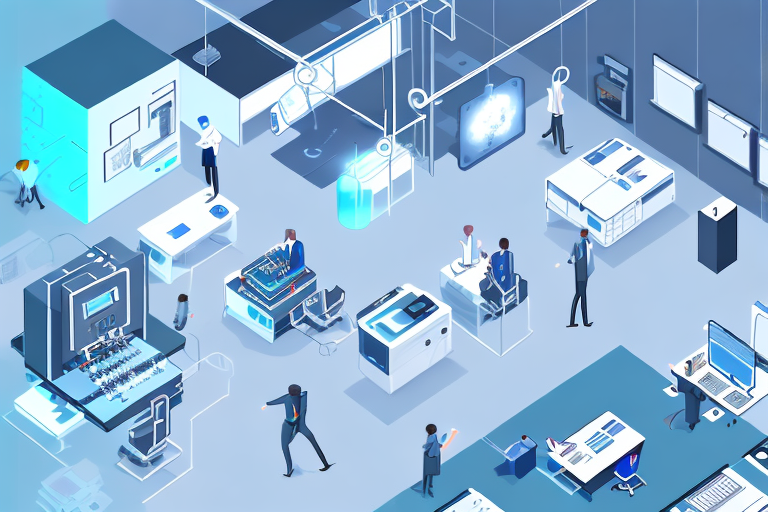Artificial Intelligence (AI) has emerged as a powerful tool that has the potential to revolutionize various industries, and software engineering is no exception. As the demand for innovative software solutions continues to grow, AI promises to enhance the efficiency and productivity of software engineering projects. By leveraging AI techniques and tools, software engineers can overcome complex challenges, improve accuracy, and reduce errors in the development process.
Understanding Artificial Intelligence in Software Engineering
Before delving into the benefits and challenges of integrating AI into software engineering, it is crucial to define what Artificial Intelligence means in this context. In software engineering, AI refers to the development of intelligent systems that can perform tasks traditionally requiring human intelligence. These tasks include learning, reasoning, problem-solving, and decision-making.
Artificial Intelligence in software engineering has revolutionized the way developers approach complex problems. By leveraging advanced algorithms and machine learning techniques, AI systems can analyze vast amounts of data and extract meaningful insights. This has opened up new possibilities for software engineers to create innovative solutions and improve the efficiency of their development processes.
Defining Artificial Intelligence in the context of Software Engineering
In software engineering, AI can be classified into two main categories: narrow AI and general AI. Narrow AI, also known as weak AI, focuses on solving specific problems within a defined domain. These AI systems are designed to excel at a specific task, such as image recognition or natural language processing. On the other hand, general AI aims to create intelligent systems capable of performing any intellectual task that a human can do. While general AI remains a goal for the future, narrow AI has already found practical applications in software engineering.
Narrow AI systems have been successfully applied in various software engineering domains. For example, in the field of software testing, AI-powered tools can automatically generate test cases, identify potential bugs, and optimize test coverage. This not only saves time and effort for software engineers but also improves the overall quality of the software being developed.
The Role of AI in Modern Software Development
A prominent role of AI in modern software development is the automation of repetitive tasks. By utilizing machine learning algorithms and techniques, AI can analyze large amounts of data, identify patterns, and generate insights. This enables software engineers to streamline their workflows, saving time and effort. Additionally, AI can assist in software testing, code generation, and bug detection, enhancing the overall development process.
AI-powered code generation tools have gained popularity among software engineers. These tools can automatically generate code snippets based on high-level specifications, reducing the time and effort required for manual coding. This not only accelerates the development process but also improves code quality by minimizing human errors.
Moreover, AI systems can analyze code repositories and identify potential vulnerabilities or code smells. By leveraging machine learning algorithms, these systems can learn from existing codebases and provide recommendations for code improvements. This helps software engineers write more robust and secure code, ultimately enhancing the overall reliability of software systems.
Another area where AI has made significant contributions is in the field of software maintenance. AI-powered systems can analyze software logs, identify patterns of failures, and predict potential issues before they occur. This proactive approach to maintenance helps software engineers detect and resolve problems early on, minimizing downtime and improving the user experience.
In conclusion, Artificial Intelligence has become an integral part of software engineering, enabling developers to tackle complex problems, automate repetitive tasks, and improve the overall quality of software systems. As AI continues to advance, its role in software engineering will only grow, opening up new opportunities for innovation and efficiency.
The Intersection of AI and Software Engineering
The convergence of AI and software engineering opens up a plethora of opportunities for innovation and improvement. Let’s explore how AI is revolutionizing the software engineering landscape and the key areas where the two disciplines intersect.
How AI is Revolutionizing the Software Engineering Landscape
One of the significant ways AI is revolutionizing software engineering is through intelligent automation. AI-powered systems can automate various tasks, such as code refactoring, bug fixing, and performance optimization. This not only saves valuable developer time but also enhances the quality and reliability of software products.
Imagine a scenario where a software engineer is working on a complex codebase. With the help of AI, the engineer can rely on automated tools that analyze the code and suggest improvements. These tools can identify potential bugs, recommend refactoring techniques, and optimize the performance of the software. This level of automation not only speeds up the development process but also ensures that the software meets the highest standards of quality.
Apart from automation, AI can also facilitate advanced data analysis. Software engineers can leverage AI algorithms to mine and analyze vast amounts of data collected throughout the software development lifecycle. This enables them to gain actionable insights and make data-driven decisions, leading to improved software quality and user satisfaction.
For example, imagine a software engineer working on a mobile application. By utilizing AI techniques, the engineer can analyze user behavior patterns, preferences, and feedback. This analysis can provide valuable insights into how users interact with the application, allowing for personalized software solutions. With AI-powered data analysis, software engineers can create user-centric applications that cater to individual needs and preferences.
Key Areas where AI and Software Engineering Converge
The convergence of AI and software engineering spans across various domains, including:
- Machine Learning and Predictive Analytics: AI techniques can be applied to analyze user behavior and preferences, enabling software engineers to develop personalized software solutions. By leveraging machine learning algorithms, software engineers can create intelligent systems that adapt and improve over time, providing users with tailored experiences.
- Natural Language Processing (NLP): NLP technologies enable systems to understand and interpret human language, allowing for more intuitive human-computer interactions. Software engineers can integrate NLP capabilities into their applications, enabling users to interact with software using natural language commands and queries. This opens up new possibilities for voice-controlled applications, virtual assistants, and chatbots.
- Automated Testing and Quality Assurance: AI-powered testing tools can automatically generate test cases and identify potential bugs, improving software reliability. These tools can simulate different scenarios, perform regression testing, and detect anomalies that might be missed by manual testing. By automating the testing process, software engineers can ensure that their applications are robust and error-free.
- Autonomous Systems and Robotics: AI can be integrated into software systems controlling autonomous vehicles, robots, and drones, enhancing their capabilities and safety. Software engineers can develop algorithms that enable these systems to perceive and interpret their environment, make intelligent decisions, and adapt to changing conditions. This convergence of AI and software engineering is driving advancements in fields such as self-driving cars, industrial automation, and smart cities.
As AI continues to evolve, the intersection with software engineering will only grow stronger. The collaboration between these two disciplines holds immense potential for creating innovative and intelligent software solutions that can transform industries and improve the lives of people worldwide.
Benefits of Integrating AI into Software Engineering
Integrating AI into software engineering projects offers several benefits that contribute to the success of software development teams and the quality of the final products.
Enhancing Efficiency and Productivity
AI tools and techniques can significantly enhance efficiency and productivity in software engineering. By automating repetitive tasks, such as code generation and bug detection, AI frees up valuable developer time. This enables software engineers to focus on more complex and creative aspects of the development process, increasing overall productivity.
Furthermore, advanced data analysis facilitated by AI can assist in project management and resource allocation. By analyzing historical data, AI systems can provide accurate estimations of project timelines and resource requirements, reducing the risk of delays and budget overruns.
Improving Accuracy and Reducing Errors
Software development involves coding, testing, and debugging, which are prone to human errors. By leveraging AI-powered tools, software engineers can detect potential bugs and vulnerabilities early on, mitigating the risk of software failures and security breaches. This not only improves the accuracy of software products but also enhances user experience and trust.
Moreover, AI techniques, such as machine learning, enable software systems to learn from data and adapt to changing conditions. This adaptive capability empowers software engineers to develop more robust and resilient solutions that can handle unforeseen circumstances.
AI Tools and Techniques for Software Engineering
AI offers a wide range of tools and techniques that software engineers can leverage to optimize their development processes and obtain better results.
AI-Powered Software Testing Tools
One area where AI has particularly shown its potential is software testing. AI-powered testing tools can automatically generate test scripts, execute tests, and identify potential defects, significantly reducing the manual effort required for comprehensive testing. These tools also enable software engineers to perform regression testing more efficiently, ensuring the integrity of software products throughout the development lifecycle.
AI Techniques for Software Design and Development
AI techniques, such as neural networks and genetic algorithms, can be used to enhance software design and development. For example, neural networks can facilitate pattern recognition and decision-making tasks, aiding software engineers in designing intuitive user interfaces. Genetic algorithms can optimize software solutions by iteratively evolving and improving upon initial designs.
Challenges and Solutions in AI-Driven Software Engineering
While AI presents numerous opportunities for improving software engineering, it also brings its own set of challenges. Addressing these challenges is crucial for successful integration of AI tools and techniques in software development.
Addressing the Challenges of AI in Software Engineering
One significant challenge in AI-driven software engineering is the need for high-quality, reliable training data. AI systems heavily rely on training data to learn and make accurate predictions. Ensuring the availability of diverse and representative training data is essential to prevent bias and improve the performance of AI models in real-world scenarios.
Privacy and ethical considerations are also paramount when integrating AI into software engineering projects. The use of user data and personal information must comply with applicable regulations and ethical guidelines. Transparency and explainability of AI algorithms and decisions are fundamental to building trust with users and stakeholders.
Potential Solutions and Future Directions
To overcome these challenges, collaborative efforts between AI researchers, software engineers, and domain experts are crucial. Data governance frameworks and ethical guidelines should be established to ensure responsible AI usage. Additionally, continued research and development in AI techniques and tools will lead to more efficient and reliable solutions, further enhancing the potential of AI in software engineering.
In conclusion, the integration of AI into software engineering projects offers numerous benefits, including enhanced efficiency, improved accuracy, and advanced data analysis capabilities. While challenges exist, addressing them through collaboration, responsible AI usage, and continuous research will allow software engineers to harness the full potential of AI and drive innovation in the field of software engineering.



